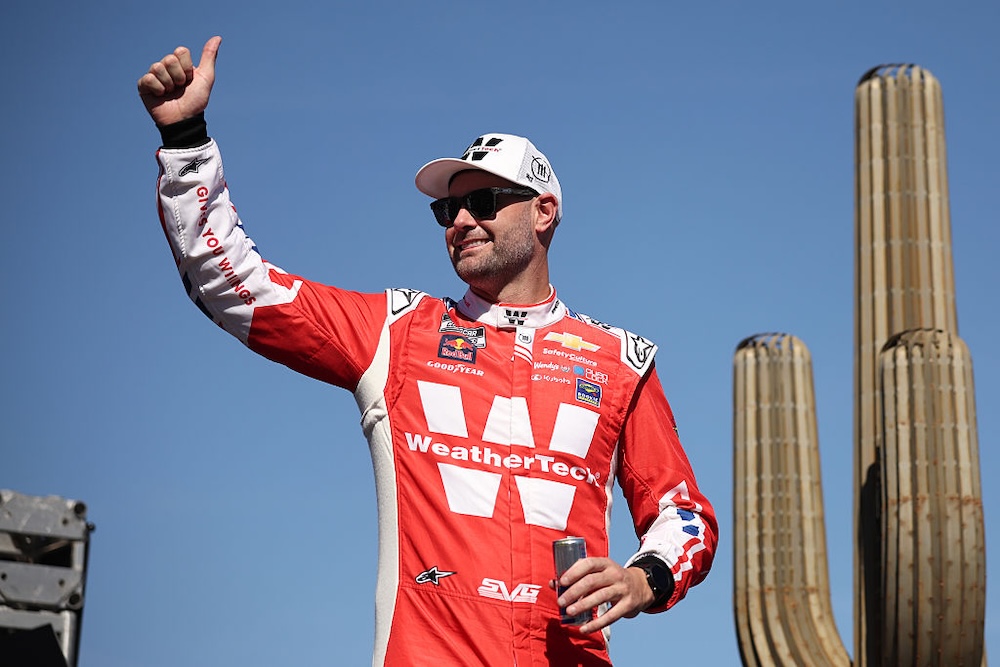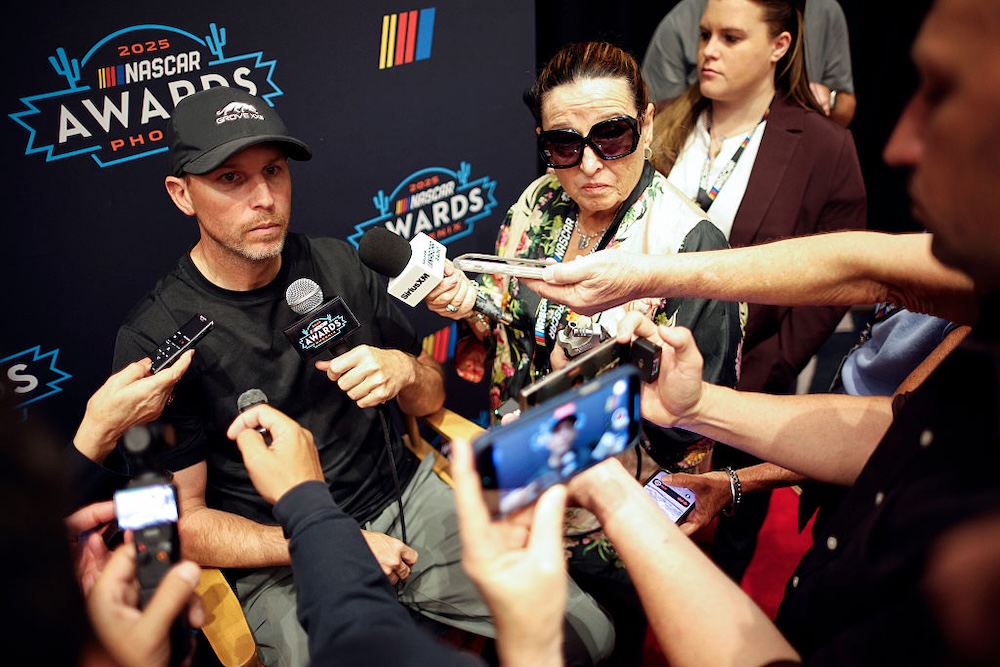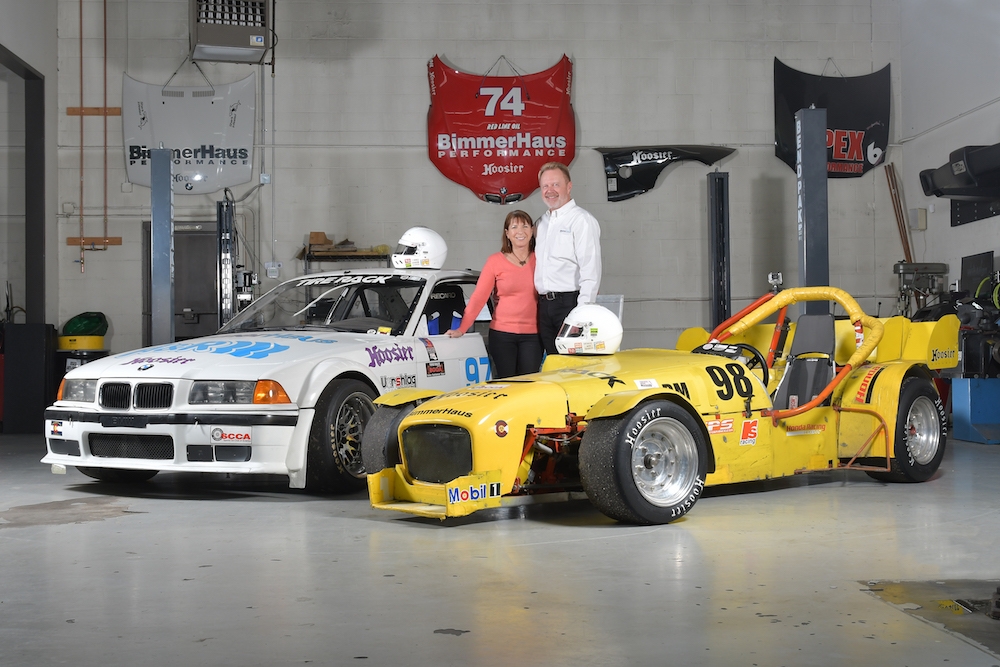
Image by Rupert Berrington
ShareThis is disabled until you accept Social Networking cookies.
The story of a lifetime
Do you know Bob and Patty Tunnell? Do you know them? Perhaps it’s time to look beyond the record book ...
The Tunnells are SCCA legends, although they’ll never admit it. Case in point, when I asked them about their 2020 induction into the SCCA Hall of Fame, Patty’s response was quick: “It's crazy to me that a person would be recognized for just being who they are.”
Yes, Patty and Bob are who they are. Yet, while they may be humble, the Club – and, as of late, a group in a very unfortunate situation in Afghanistan – are reaping the benefits.
This raises the question: Who are Bob and Patty Tunnell? For starters, their list of SCCA accomplishments is never ending, and it’s probably an understatement to say that they’ve won it all. The couple began autocrossing in the mid 1980s, with Patty claiming the first SCCA Solo National Championship title for the duo in 1990; Bob’s first title came in 1992. Today, the Tunnells have amassed a blistering collection of more than 30 Solo National Championship and ProSolo titles.
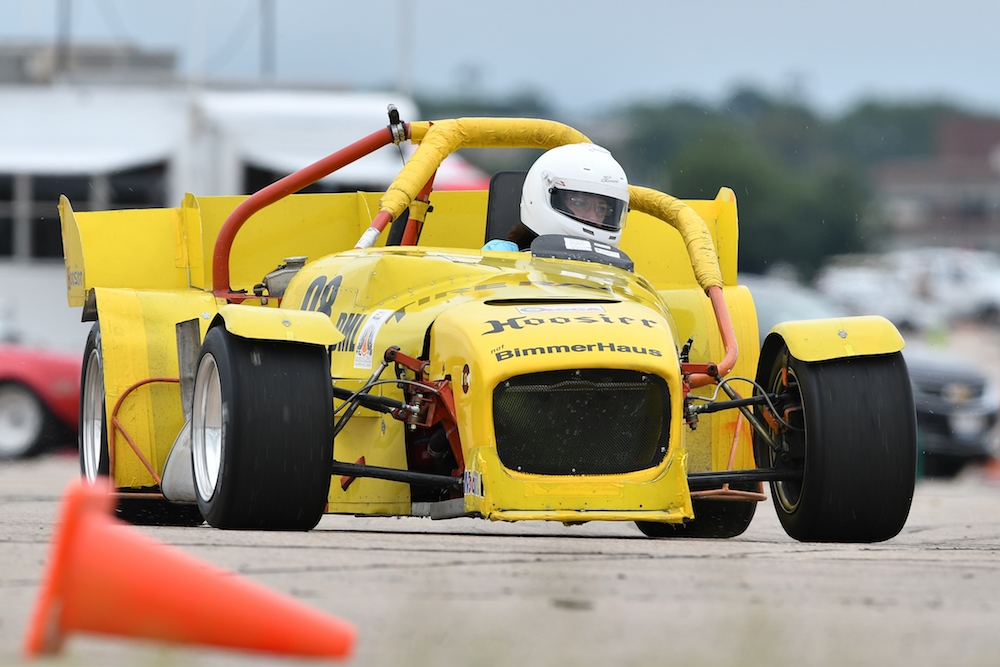
Patty at the 2018 Solo National Championships. Image by Rupert Berrington
Furthermore, both Bob and Patty are tied with Mark Daddio for the most Solo Nationals wins in different categories (the Tunnells have won in Stock, Street Prepared, Street Modified, Prepared, and Modified), and Patty has won the most championships of any competitor in different classes (tallying 11). Patty also sits atop the listing for the most Solo Nationals trophies and longest trophy streak. In all, Patty has an amazing 15 Solo National Championship titles to her name; Bob “only” has seven. Combined, the power-couple has also scored 11 ProSolo titles.
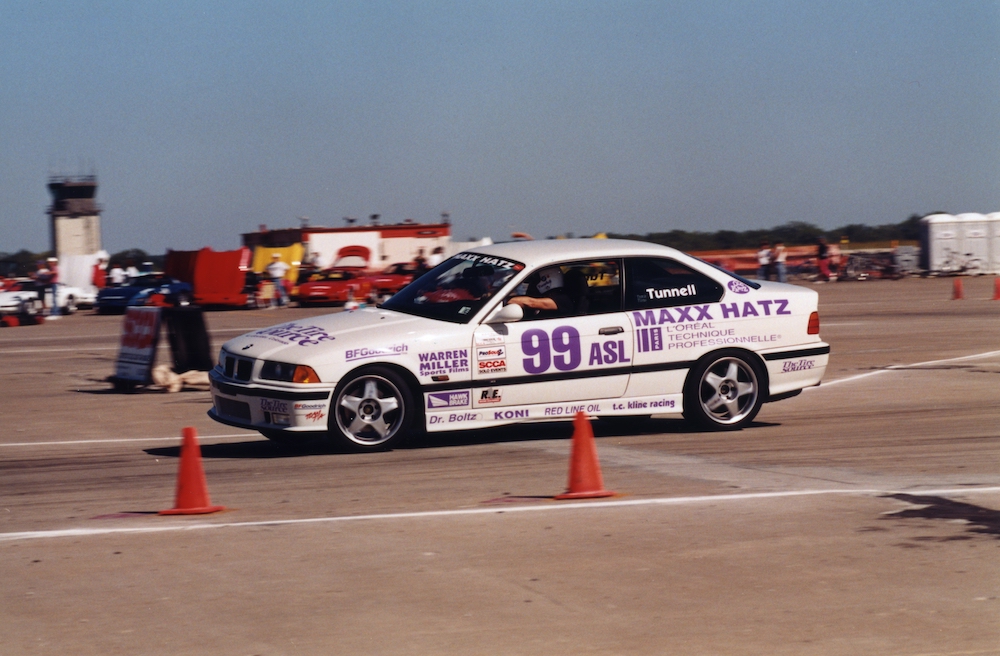
Familiar sight: One of the Tunnells (this is Bob) on route to a Solo victory. Image by D. E. Baer
And it doesn’t stop there. In 2002, Bob and Patty were presented with the Solo Driver of Eminence Award, and Patty also received the Roger Johnson Spirit of the Sport Award. In 2007, Bob was presented with the Solo Cup, the sport’s highest award. They’re both Silver Circle members (meaning they’ve competed at 25 or more Solo National Championships), and Bob is credited with the creation of the Old Fartz in 1995, which was designed to grow the sport through mentoring. Along the way, Bob has also served on the Solo Events Board, the SCCA Hall of Fame committee, and has been Chief Steward for the Tire Rack Solo National Championships. Then, in 2020, Patty and Bob were inducted into the SCCA Hall of Fame.
Autocrossing isn’t their only specialty, either. While Bob most recently assisted in the reinvigoration of SCCA’s Time Trials program and Track Night in America Powered by Tire Rack, in the late 1990s, before the couple created Bimmer Haus, the BMW performance shop they opened in 2001, they also tried their hand at SCCA Road Racing.
“In '97, we were autocrossing, and we knew Jim Leithauser really well – he worked at SCCA,” Bob explains. “He had an ITA Honda CRX, and one of his favorite things to do was to let people take it out at a track day and drive it to see what they thought.”
The Tunnells were all in, racing in Showroom Stock and Touring. Patty competed at the SCCA National Championship Runoffs twice, while Bob competed three times, scoring a best finish of fourth. Patty’s road racing came to a close following an unrelated brain injury – “I had to learn how to drive again, and how to cook,” she notes – and soon thereafter they hung up their road racing gloves.
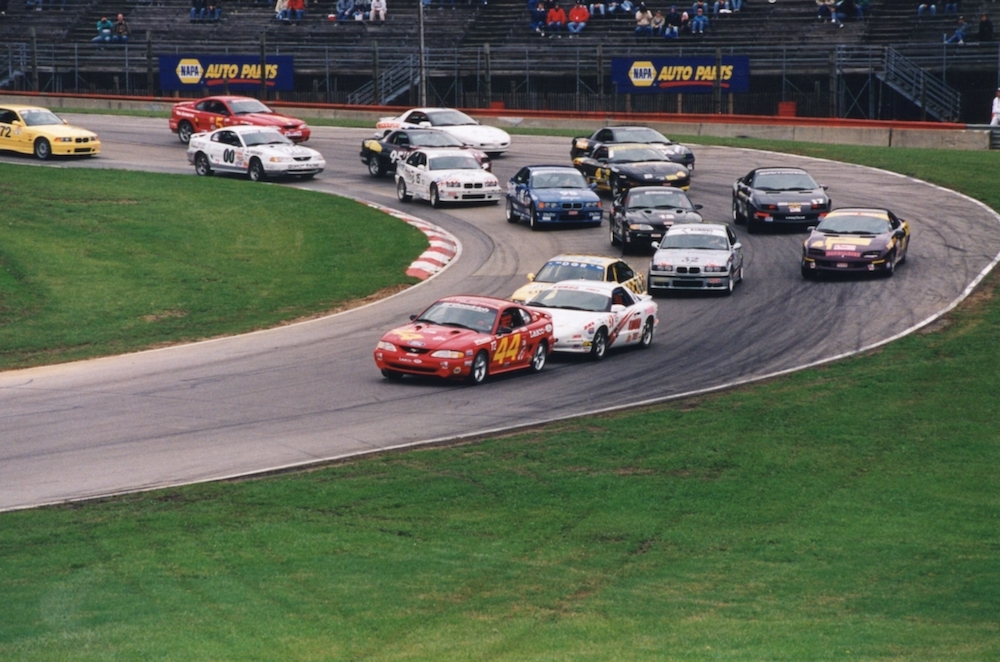
Bob's blue BMW is in there somewhere! Hectic Touring 2 action at the '98 Runoffs. Image by Ken Brown
I’ve undoubtedly missed many details of their SCCA careers, but it hardly matters. You see, this isn’t a story about their motorsport accomplishments. Instead, I want to tell you something very special about the Tunnells.
“My life started when I met Patty,” Bob says as the couple chats with me from their Bimmer Haus shop, located just outside of Denver, Colo. “I was 16-years old – I've been with her 51 years now. I barely remember life before we met. That's kind of the starting point for me. That was back in the day after Christmas 1968. We ended up riding the bus together with our high school group from our church from Portland to Santa Barbara, Calif., to attend a convention — a Grace Gospel Fellowship Convention associated with our church.”
“There's the beginning of the love story,” Patty laughs.
“Yeah, that's the beginning of the fairytale,” Bob agrees, adding, “but when we're talking to other people and being really honest about things, it hasn't actually been a fairytale. I just want people to know that when you're together 51 years, when you start out when you're 15 and 16 and you make it into your 50s, a lot of changes take place.”
It was at this point in the conversation that I knew this was not a story about their autocrossing accomplishments. And their story kept getting better.
“We worked together,” Bob continues. “I was at Warren Miller Films – we were both at Warren Miller Films for a number of years. I think we viewed it as the job of a lifetime when it was going on. I got hired by Warren Miller's son, Kurt, and his business partner. They were looking to buy the company from Warren himself. They were both outstanding sales and marketing guys, and they needed a good administrator to help run the company so they could be out selling everything.”
Obviously, this wasn’t Bob and Patty’s first job. Patty had worked in bill collections at Sears, while Bob had done a little bit of everything, from mounting ski bindings, to building houses, to remodeling concession stands at what is now Pacific Raceways. But it was at Warren Miller Films that the two got a taste of working together. It was also when the couple moved to Southern California, and then, ultimately, to Colorado, when they relocated the Warren Miller outfit.
Following this job came the creation of ProParts USA. “It was a joint venture with Craig Nagler and T.C. Klein,” Bob explains. They hired me to put together the website and catalog, and to help with their marketing plan. We then hired Jim Leithauser.
“Ultimately, Craig and T.C. decided to part company, and I was left not being sure what to do,” Bob chuckled. “I loved cars, and I loved working with T.C. and Craig and seeing how those guys approached racing and motorsports with a very high level of professionalism. I wanted to do that, but I didn't know exactly where to start.”
During the Christmas season in 2000, Patty and Bob went to a BMW Club banquet, and this was where he discovered a local BMW shop was for sale. “We got out-bid by some really deep pockets,” says Bob, “but the mechanics of the shop came to me and said, ‘Hey, we really want to work for you because the new owners are going to turn this into just a regular old hot-rod shop, and we're BMW guys. If you go rent a building, we'll come to work for you.’
“Jim Leithauser really liked that idea, so he and I, with a clean sheet of paper, bought two units of an old envelope manufacturing company and opened Bimmer Haus in July 2001,” Bob continues. “This is going to sound really corny, but it's the absolute truth: We spell it B-i-m-m-e-r H-a-u-s, but I have always had this phrase in my mind that this is the house that Solo built, because when we started autocrossing in 1983, '84, '85, every time we bought a car and raced it, we would sell it, make a little money on it, buy another car, and we continued to upgrade from a Scirocco to a Rabbit to a Jetta to a 16-valve Jetta. Then T.C. got us involved in BMWs and it was a 318 to the M3.
“We continually kept looking for more championships and continually expanded our racing program to the point that when we opened this shop, it was totally based on our autocross reputation and soliciting local SCCA members who knew and trusted us. We're still very active in the local SCCA Regions.”
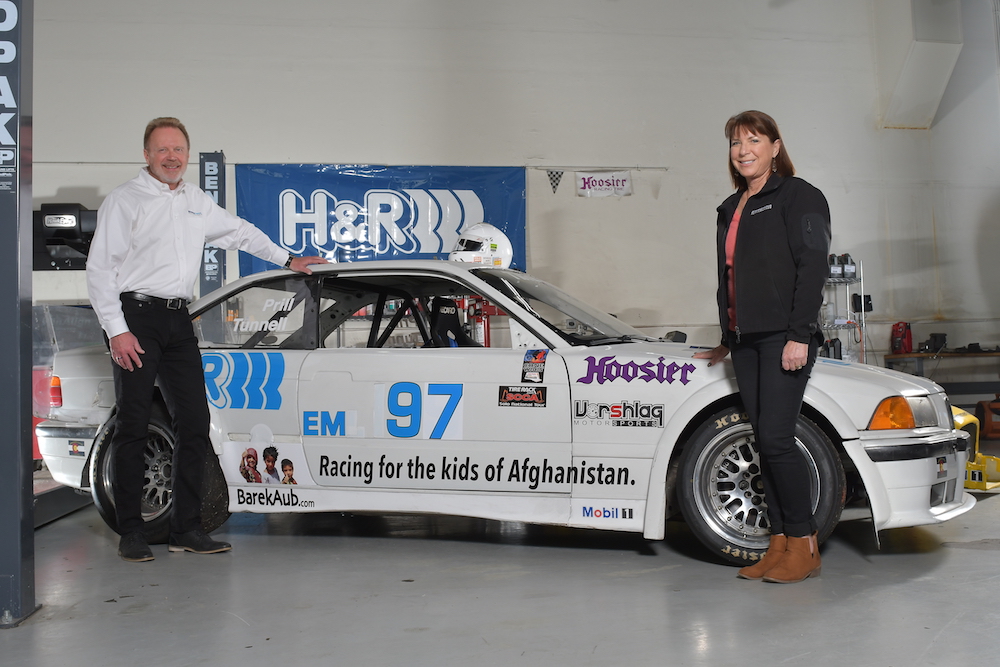
With their typically immaculate BMW at last year's Solo Nationals. Image by Rupert Berrington
Interesting stuff, right? But this isn’t the story of how Bob and Patty met, or how Bimmer Haus was founded. For the real story, we fast-forward to the fall of 2007, where the Tunnells were running a well-established performance shop and competing in more than 30 autocrosses a year. Little did they know, their lives were about to change.
“We were at church one October,” Bob recalls, “and our pastor said, ‘We just learned about a village in Afghanistan. It's a group of refugees. They've been dumped out basically in the middle of the desert. The weather in Kabul is very similar to the weather in Colorado, so it's going to be really cold in the next couple of weeks. So, if you wore a jacket to church this morning, and you probably won't need it going home, why don't you just drop it off. We've got a group going over there next week to see what we can do to help. We'll fill a couple of duffle bags with jackets and we'll take them over, giving them to the people over there to help them stay warm this winter.’”
Bob was, indeed, wearing a jacket, and on a whim, he left his jacket – as did a lot of parishioners. “We go to a fairly large church,” Bob smiles. "They got 4,000 jackets.”
Needless to say, not all jackets made that first trip, although they did eventually.
A month later, the church group returned from Afghanistan, and Bob and Patty found themselves at a friend’s Christmas party. “She happened to be on the trip that took the jackets over, and she had a DVD of the video footage,” Bob recalls.
“In the video, I saw them hand my jacket to a young Afghan man,” Bob says, pausing for a moment to collect himself – the memory of that moment still gets to him. “It hit me like a ton of bricks that the jacket that I just casually took off and left there, that jacket was going to keep a young college-age Afghan warm that winter. Maybe, and I don't think I'm being too dramatic by saying this, it might have kept him alive.”
“This is a group of people out in the middle of nowhere,” Patty explains. “There's no food. There's no water. There's no shelter except for some tarps that the government left with them. These people are dying.”
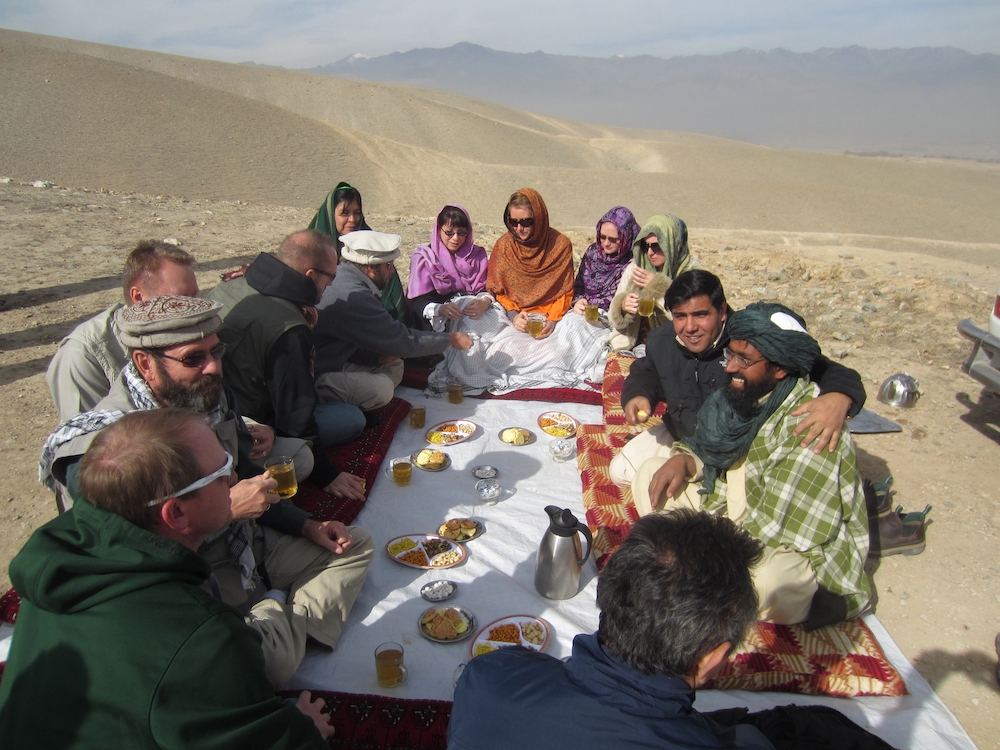
Image courtesy Bob Tunnell
“We came home from the Christmas party, and we didn't really say anything to each other about how we were feeling,” Bob says. “The next weekend, I wanted to talk to Patty about this because we knew there was going to be another group going to Afghanistan in March or April.
“Cut back to 1974, when I proposed to Patty, I got a ‘Yes, but,’ response,” Bob chuckles. “At the time, I'd actually been considering going to a Bible college and possibly going into the ministry. So, Patty said, ‘I will marry you, but I will not be a pastor's wife. I will not be a missionary's wife.’
“Back to late 2007: I wanted to talk to her about possibly of taking this trip to Afghanistan to see this village and see what we could do to help over there, and I'm flashing back to my proposal where she said, ‘No way. I am never going to be a missionary's wife. I'm never going to be a missionary. We're never doing that.’”
The two headed for their walk, where Patty revealed she wanted to speak to Bob about something. “All of a sudden my thoughts of going to Afghanistan shifted to, she wants a divorce,” Bob laughs.
“You thought I had a boyfriend or something,” Patty laughs. “But no, I just remember saying, ‘I think we should go to Afghanistan. I have no idea what we would do or how we could possibly help, and I know it's crazy, but what do you think?’”
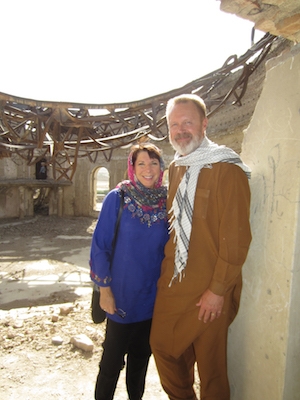
Image courtesy Bob Tunnell
Since then, Bob has gone to Afghanistan 23 times and Patty 13. And Patty and Bob are quick to point out that these aren’t missionary trips. In fact, they’re not teaching or even helping construct buildings. Manpower, the Tunnells say, is not something the people in this community need.
“When you go out into a remote village in Afghanistan, and a woman comes up and takes your hand or takes Patty's hand and starts speaking Dari, we have no idea what she's saying but she's got tears rolling down her face,” Bob says. “Then when the translator can interrupt her for a second and tell us what she's saying, she's saying, ‘Thank you for coming over here. You have saved my children's lives. You're the only group that comes over. Lots of people send us money. But you come and spend time with us and drink tea with us.’ When something like that happens, it just melts your heart.”
“But this is not us,” Patty points out of their volunteer work. “We don't do things like this.”
While they might not admit it, this is, indeed, exactly who Patty and Bob Tunnell are. It’s also the reason why, when they diverted funding from autocrossing so they could take trips to Afghanistan, others helped keep them at the Solo course.
“Roland Graef at H&R Special Springs, Bruce Foss and Jeff Speer at Hoosier, and Randy Chase – they’ve been so supportive of everything we're doing,” Bob expounds. “Paul and Lynne Rothney-Kozlak, Paul and Meredith Brown and, well, I shouldn’t name names because there are so many people in the SCCA world who have helped us out with this cause,” says Bob.
Hours after our conversation, Patty’s words kept rattling in my brain, her insisting that their actions were not who they are. They don’t volunteer, she’d implied, and they don’t fly halfway around the world to help those in need. And, you know, she’s partly right. The SCCA record book says nothing of that – which is why this is not that story. Truly, Bob and Patty’s track record is the real tale to tell. Theirs is an amazing story, and it’s every bit of who the Tunnells are.
This feature originally appeared in the April 2020 issue of SportsCar magazine, the official publication of the Sports Car Club of America and just one of the many benefits of membership in the SCCA.
Topics
ShareThis is disabled until you accept Social Networking cookies.
Philip Royle
Read Philip Royle's articles
Latest News
Comments
Disqus is disabled until you accept Social Networking cookies.
